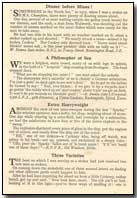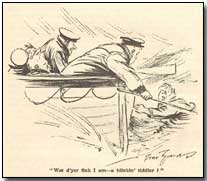Memoirs & Diaries - The Best 500 Cockney War Stories - Three Varieties and Other Stories
 Published in London
in 1921, The Best 500 Cockney War Stories
comprised, in the words of its newspaper publisher (The London Evening
News) "a remembering and retelling of those war days when laughter
sometimes saved men's reason".
Published in London
in 1921, The Best 500 Cockney War Stories
comprised, in the words of its newspaper publisher (The London Evening
News) "a remembering and retelling of those war days when laughter
sometimes saved men's reason".
The collection of short memoirs, some 500 in total, is divided into five categories - Action, Lull, Hospital, High Seas and Here and There. This page contains five stories from High Seas, led by Three Varieties.
Other sections within the collection can be accessed using the sidebar to the right.
Three Varieties
The boat on which I was serving as a stoker had just received two new men as stokers. On coming down the stokehold one of them seemed intent on finding out what different perils could happen to him.
After he had been inquiring for about an hour a little Cockney, rather bored, got up and said, "Now look here, mate. The job ain't so bad, looking at it in this light - you've three ways of snuffing it: one is burnt to death, the other is scalded to death; or, if you're damn lucky, drowned. That's more chances than they have upstairs."
B. Scott (late Stoker, H.M.S. Marlborough), 29 Stanley Road, Southend-on-Sea, Essex
He was a Bigger Fish
The battleship in which I was serving was picking up survivors from a torpedoed merchantman in the North Atlantic. They had been drifting about for hours clinging to upturned boats and bits of gear that had floated clear of the wreckage.
Our boat had picked up three or four half-drowned men and was just about to return to the ship when we espied a fat sailor bobbing about with his arms around a plank. We pulled up close to him and the bow-man leaned out with a boat-hook and drew him alongside.
He seemed to have just strength enough left to grasp the gunwale, when we were surprised to hear him shout, in an unmistakable Cockney voice: "All right, cockey, un'itch that boat 'ook. Wot d'yer fink I am - a blinkin' tiddler?"
Leslie E. Austin, 6 Northumberland Avenue, Squirrels Heath, Romford, Essex
The "Arethusa" Touch
During the action off Heligoland in August 1914 the light cruiser Arethusa came under a hot fire. A shell penetrated the chief stoker's mess, knocked a drawer full of flour all over the deck, but luckily failed to explode.
A Cockney stoker standing in the mess had a narrow escape, but after surveying the wreckage and flour-covered deck all he said was: "Blowed if they ain't trying to make a blinkin' duff in our mess!"
C. H. Cook (Lieut., R.N.V.R.), 91 Great Russell Street, W.C.1
His Chance to Dive
During the early part of 1917, whilst I was serving with one of H.M. transports, we had occasion to call at Panama for coaling purposes before proceeding to England via New York.
One of our many Cockney sailors was a fine swimmer and diver. He took every opportunity to have what he termed "a couple of dives."
Owing to the water being rather shallow immediately along the quay, his diving exhibitions were limited to nothing higher than the forecastle, which was some 30 ft.
His one desire, however, was to dive from the boat-deck, which was about 60 ft. Whilst steaming later in the front line of our convoy, which numbered about forty-two ships, we became the direct target of a deadly torpedo. Every soul dashed for the lifeboats.
After things had somewhat subsided I found our Cockney friend - disregarding the fact that our ship was badly damaged and was now listing at an almost impossible angle - posing rather gracefully for a dive.
He shouted, "Hi! hi! Wot abaht this'un? I told yer I could do it easy!"
He then dived gracefully and swam to a lifeboat.
Bobbie George Bull (late Mercantile Marine), 40 Warren Road, Leyton, E.10
Wot Abaht Wot?
In 1917 our job on an armed merchantman, H.M.A.S. Marmora, was to escort food ships through the danger zone. One trip we were going to Sierra Leone, but in the middle of the afternoon, when about two days out from Cardiff, we were torpedoed.
The old ship came to a standstill and we all proceeded to action stations. Just as we were training our guns in the direction of the submarine another torpedo struck us amidships and smashed practically all the boats on the port side.
"Abandon ship" was given, as we were slowly settling down by the bows.
Our boat was soon crowded out, and there seemed not enough room for a cat. The last man down the life-line was "Tubby," our cook's mate, who came from Poplar.
When he was about half way down the boat was cut adrift and "Tubby" was left hanging in mid-air. "Hi!" he shouted. "What abaht it?"
Another Cockney (from Battersea) replied: "What abaht what?"
"Abaht coming back for me."
"What do you take us for," said the lad from Battersea; "do yer fink we all want the sack fer overcrowdin'?"
"Tubby" was, of course, picked up after a slight immersion.
C. Phelps (late R.M.L.I.), 36 Oxford Road, Putney, S.W.'s
Next - Water on the Watch and four other stories
Britain introduced conscription for the first time on 2 February 1916.
- Did you know?

